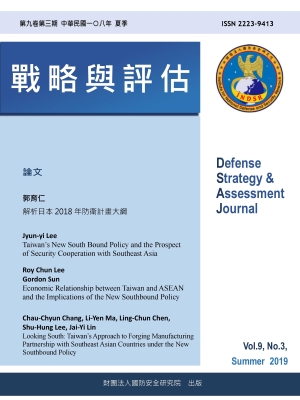Taiwan’s New South Bound Policy and the Prospect of Security Cooperation with Southeast Asia
2019.10.18
Views
470
Author:
Assistant Research Fellow, Division of Non-traditional Security and Military Missions, Institute for National Defense and Security Research
Jyun-yi Lee
Abstract
This paper contends that Taiwan’s New Southbound Policy is not just a trade and economic policy, but should be located at the strategic level and taken as part of Taiwan’s foreign and security policy. To seek a common ground on which the goal of “forging a sense of community” may be achieved, the paper briefly explores national security policy and practice of five ASEAN members, Indonesia, Malaysia, the Philippines, Thailand, and Vietnam. It is found that the South China Sea issue and the rise of China may not necessarily be a common concern for the five countries. Instead, they all prioritize maritime security and other internal security issues. To establish some commonality between Taiwan and the Southeast Asian countries, this paper suggests that Taiwan should first promote itself as a case to test the notion of “rules-based order,” because even if China may not be taken as an existential threat for Southeast Asian countries, it’s rise to a hegemon still poses certain risks that need to be managed collectively. Second, the paper suggests that Taiwan may seek security cooperation with its neighbors through capacity-building/enhancing projects that are concrete and less politically sensitive, so as to cultivate substantial relationships on a
PDF Link:
Image Source: CNA


